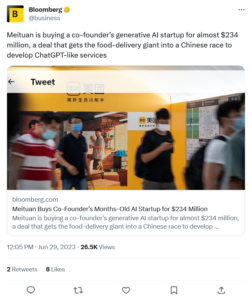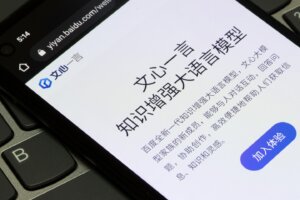Chinese billionaires investing in generative AI

• Chinese billionaires are entering the generative artificial intelligence race, despite obstacles.
• Japanese businesses predominantly about the use of generative AI.
• US attempts to keep high-powered chips out of Chinese hands won’t stop development.
As Chinese billionaires begin funding research at home, a survey carried out by Teikoku Databank found that 61% of Japanese firms have a positive stance on using generative AI in their operations. While only 9.1% of the companies polled said they’re utilizing generative AI in their operations right now, a more impressive 52% said they are considering using it.
23.3% of companies in Japan aren’t considering it due to concerns about data breaches – suggesting a single point of reluctance, which if acceptably addressed could boost Japanese take-up significantly. The survey was conducted online for four days and received valid responses from 1,380 companies.
Of those companies, 37.8% said that although they were considering the use of generative AI, they didn’t have any specific ideas for fitting it into operations.
Be that as it may, in China, the tech sector is newly preoccupied with competing with US companies like Google and Microsoft in the global artificial intelligence race. Chinese billionaires are investing in, and developing, startups that promise to deliver breakthroughs in generative AI’s capabilities.
Among those entering the race is internet mogul Wang Xiaochuan, who joins ranks of Chinese scientists, programmers and financiers – including ex-employees of Bytedance, JD.com and Google – expected to generate $15billion of spending on AI technology this year alone.
ChatGPT’s launch in November 2022 piqued the interest of Wang, who by June this year had a firm ready to launch an open-source large language model. The model is already in use by researchers at China’s two most prominent universities.
“We all heard the sound of the starter pistol in the race. Tech companies, big or small, are all on the same starting line,” said Wang, who named his startup Baichuan or “A Hundred Rivers.” “China is still three years behind the U.S., but we may not need three years to catch up.”
Xi Jinping’s administration recognizes that AI will be critical to maintaining China’s ascendancy and is likely to mobilize the nation’s resources to drive advances. Generative AI services could speed the emergence of new platforms to host revolutionary apps for businesses and consumers.
Analysts believe AI will dictate the tech giants of the future, just as the emergence of the internet and the smartphone did. Of course, it also has huge potential to tilt the geopolitical scale.
Right now, US investments in artificial intelligence are much bigger. In mid-June, the US totalled $26.6billion investments, compared to China’s $4billion. The gap is narrowing, though, at least in terms of deal flow. Chinese venture deals in AI comprised more than two-thirds of the US total of around 447 in the year to mid-June.

The US has the advantage in time and investment – for now. But it might not take long for China to catch up.
China-based AI venture deals also outpaced consumer tech in 2022 and 2023, according to data collected by a consultancy called Preqin.
Many of the fledgling firms that are entering the AI are aiming for the domestic market, given the hostility to Chinese technology on the global market. All the same, there’s a gap in the consumer market that’s equally confined to domestic products.
Chinese billionaires won’t miss their “iPhone moment”
No one today wants to miss out on what Nvidia Corp. CEO Jensen Huang called the “iPhone moment” of their generation.
“This is an AI arms race going on in both the US and China,” said Daniel Ives, a senior analyst at Wedbush Securities. “China’s tech industry is dealing with a stricter regulatory environment around AI, which puts one hand behind the back in this ‘Game of Thrones’ battle. This is an $800 billion market opportunity globally over the next decade, and we are only in the very early stages.”
Chinese demos show that there’s still a long way to go; innovation needs the freedom of experimentation and exploration that the US cultivates. Censorship in China means the datasets China’s aspirants are working with are inherently flawed and artificially constrained.

Chinese interest in generative AI is growing exponentially.
What’s more, Beijing’s top internet overseer has signalled that the onus for training algorithms and implementing censorship is on platform providers.
“Beijing’s censorship regime will put China’s ChatGPT-like applications at a serious disadvantage vis-a-vis their US peers,” said Xiaomeng Lu, director of the Eurasia Group’s geotechnology practice.
Finally, the elephant in the room is that powerful chipsets from the likes of Nvidia are crucial in training large AI models – the same technology that Washington has banned from the country.
YOU MIGHT LIKE

Japan is a critical market for Vision Pro to conquer
Despite the hurdles, the ambitious startups and billionaires have their sights set on surpassing the US on AI. Executives, including some from Tencent, argue models can add more chipsets to make up for lesser performance.
Wang of Baichuan says the startup gets by with Nvidia’s A800 chips and will obtain more capable H800s in June.
Billionaire Baidu founder Robin Li, who in March unfurled China’s first answer to ChatGPT, has said the US and China both account for roughly a third of the world’s computing power. That alone won’t make the difference, because “innovation is not something you can buy.”

Baidu, whose founder Robin Li is among those interested in GenAI.
“Why aren’t people willing to invest in the longer-term and dream big?” asked Wayne Shiong, a partner at China Growth Capital. “Now that we’ve been handed this assignment by the other side, China will be able to play catch-up.”









